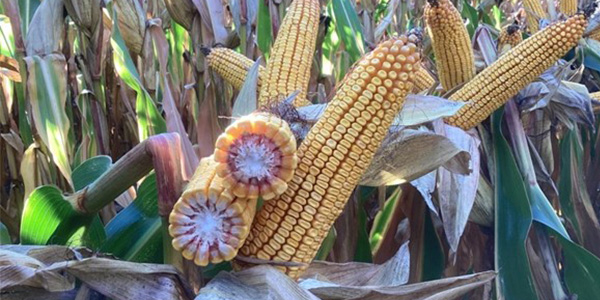AGRONOMIC RESOURCESTO SUPPORT EVERY SEASON
YOU CAN TAKETO THE FIELD
Navigate Challenging Weather Variables to Protect Corn Yield
After extreme weather conditions early in the growing season, some corn farmers are concerned about the economics of managing their crop and achieving strong corn yields. But if they are strategic with that management, the corn crop can still finish strong, say LG Seeds Agronomists Kyle Malcolm and Bryant Luers.
Key points
- Scouting fields for weeds and disease threats is critical.
- To maximize the investment in inputs, target application timing.
- Hybrid selection is the first line of defense amid challenging weather variables.
“Last year, many farmers thought their crop was going to be a failure in June but ultimately had one of the best corn crops they ever raised,” says Indiana-based Malcolm. “While early season variability may have cost farmers plants or limited root growth, if that hybrid can flex with more favorable weather in later stages, yield won’t be as severely impacted. Remember, corn can add yield all the way to black layer.”
Malcolm and Luers offer advice for farmers navigating the challenges of a variable season, helping them troubleshoot corn stressors and maximize their return on investment (ROI) for the most successful corn crop possible.
#1: Control weed and disease pressure
Weather has made weed management a challenge for some areas. “We’ve seen more issues after planting — either from too much rain making herbicides more difficult to apply, or several weeks of dry weather that makes it difficult for residuals to activate,” Malcolm explains.
Luers, based in Iowa, says waterhemp growth is significant. “While farmers were unable to get in the fields, waterhemp was still growing,” he says. “I expect to see some waterhemp plants rise through the canopy when we get into August.”
Luers also advises farmers to keep an eye out for disease threats: “Tar spot, Northern corn leaf blight and gray leaf spot thrive with the weather we've had recently. Now, warmer weather with high humidity and winds may encourage gray leaf spot and southern rust to take hold.”
Scouting fields for disease threats is critical, Malcolm says. “It's important to walk fields and understand what's out there.”
#2: Maximize the value of inputs
Many farmers have concerns about the costs of inputs to
manage stressed corn crops. “Farmers often know what they can do to make these situations better, but the extra costs can be hard to stomach,” Luers says.
To maximize investments, Malcolm recommends farmers target application timing. “Two weeks before pollination and two weeks after pollination are going to be the most critical times for keeping as many kernels on that ear as possible,” he says. “Once kernels are on the plant, give the crop the nutrients it needs to get the heaviest kernel possible.
Luers stresses the importance of focusing management efforts on the best-performing fields. “I encourage farmers to invest in protecting yield because those fields are going to provide the best return.”
It’s important to consider the cost versus benefits of a second application, which Malcolm explains may be necessary when there is a lack of moisture for activation. “Despite potential added costs, controlling weeds may prevent them from hurting your corn yield in the long run,” he says.
In some cases, Malcolm says holding off on a second application may be best. “If there’s no rain in the forecast and not a lot of weed pressure in a field, it may not be worth focusing on a second application,” he says. “Allocate dollars where you're going to see your biggest ROI.”
#3: Place the right hybrids on the right acre
Hybrid selection is a major factor in how variable weather impacts yield. “Pick a hybrid that can handle varying conditions — whether it's wet or hot or drought conditions — and understand the impact that hybrid may have while experiencing stress,” Malcolm advises, noting hybrid selection is all about balance.
“Every farm is different. Tailoring products and managing their needs differently, whether the goal is high yield or a certain disease tolerance, is the most important management decision farmers can make,” Malcolm says.
Effective hybrid selection, disease management and weed control are crucial for maximizing yield potential amid variable growing conditions. Reach out to your local LG Seeds
agronomist or district sales manager for support in getting the most out of your corn crop in any environment.





